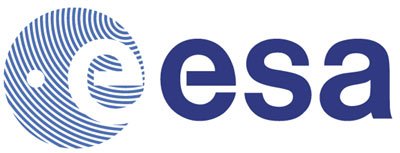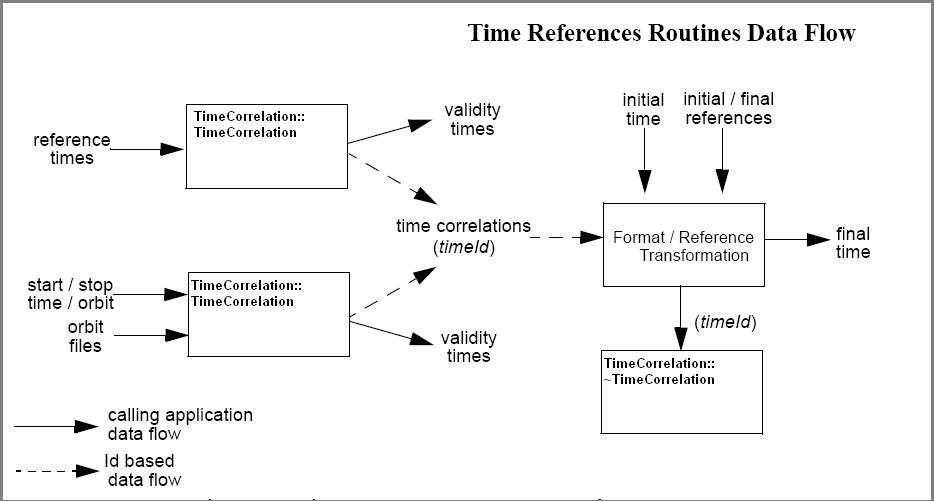 |
Earth Observation Mission CFI Software Lib Software User Manual for JAVA |
 |
 |
Earth Observation Mission CFI Software Lib Software User Manual for JAVA |
 |
| Code | EO-MA-DMS-GS-023 |
| Issue | 4.29 |
| Date | 09/04/25 |
| Name | Function | Signature | |
| Prepared by: | EOCFI Team | Project Engineers | |
| Checked by: | Inês Estrela | Project Manager | |
| Approved by: | Antonio Gutierrez | Division Head |
| Contract Data | Classification | ||
|---|---|---|---|
| Contract Number: | 4000102614/1O/NL/FF/ef | Internal | |
| Public | |||
| Contract Issuer: | ESA / ESTEC | Industry | X |
| Confidential | |||
| External Distribution | ||
|---|---|---|
| Name | Organization | Copies |
| Electronic handling | ||
|---|---|---|
| Document generator: | Doxygen 1.7.1 | |
| Electronic file name: | eo-ma-dms-gs-013-10 | |
| Issue | Change Description | Date | Approval |
|---|---|---|---|
| 1.0 | These libraries corresponds to version 4.0 of C libraries. | 22/06/09 | |
| 4.1 | These libraries corresponds to version 4.1 of C libraries. | 07/05/10 | |
| 4.2 | These libraries corresponds to version 4.2 of C libraries. | 31/01/11 | |
| 4.3 | These libraries corresponds to version 4.3 of C libraries. | 06/02/12 | |
| 4.4 | These libraries corresponds to version 4.4 of C libraries. | 05/07/12 | |
| 4.5 | These libraries corresponds to version 4.5 of C libraries. | 01/03/13 | |
| 4.6 | These libraries corresponds to version 4.6 of C libraries. | 03/10/13 | |
| 4.7 | These libraries corresponds to version 4.7 of C libraries. | 28/03/14 | |
| 4.8 | These libraries corresponds to version 4.8 of C libraries. | 29/10/14 | |
| 4.9 | These libraries corresponds to version 4.9 of C libraries. | 23/04/15 | |
| 4.10 | These libraries corresponds to version 4.10 of C libraries. | 29/10/15 | |
| 4.11 | These libraries corresponds to version 4.11 of C libraries. | 15/04/16 | |
| 4.12 | These libraries corresponds to version 4.12 of C libraries. | 03/11/16 | |
| 4.13 | These libraries corresponds to version 4.13 of C libraries. | 05/04/17 | |
| 4.14 | These libraries corresponds to version 4.14 of C libraries. | 16/11/17 | |
| 4.15 | These libraries corresponds to version 4.15 of C libraries. | 20/04/18 | |
| 4.16 | These libraries corresponds to version 4.16 of C libraries. | 09/11/18 | |
| 4.17 | These libraries corresponds to version 4.17 of C libraries. | 10/05/19 | |
| 4.18 | These libraries corresponds to version 4.18 of C libraries. | 08/11/19 | |
| 4.19 | These libraries corresponds to version 4.19 of C libraries. | 29/05/20 | |
| 4.20 | These libraries corresponds to version 4.20 of C libraries. | 30/11/20 | |
| 4.21 | These libraries corresponds to version 4.21 of C libraries. | 23/06/21 | |
| 4.22 | These libraries corresponds to version 4.22 of C libraries. | 22/12/21 | |
| 4.23 | These libraries corresponds to version 4.23 of C libraries. | 23/06/22 | |
| 4.24 | These libraries corresponds to version 4.24 of C libraries. | 29/11/22 | |
| 4.25 | These libraries corresponds to version 4.25 of C libraries. | 10/05/23 | |
| 4.26 | These libraries corresponds to version 4.26 of C libraries. | 31/10/23 | |
| 4.27 | These libraries corresponds to version 4.27 of C libraries. | 07/06/24 | |
| 4.28 | These libraries corresponds to version 4.28 of C libraries. | 13/12/24 | |
| 4.29 | These libraries corresponds to version 4.29 of C libraries. | 09/04/25 |
|
| ANX | Ascending Node Crossing |
| AOCS | Attitude and Orbit Control Subsystem |
| ASCII | American Standard Code for Information Interchange |
| BOM | Beginning Of Mission |
| CFI | Customer Furnished Item |
| EOM | End Of Mission |
| ESA | European Space Agency |
| ESTEC | European Space Technology and Research Centre |
| GPL | GNU Public License |
| GPS | Global Positioning System |
| IERS | International Earth Rotation Service |
| I/F | Interface |
| LS | Leap Second |
| OBT | On-board Binary Time |
| OSF | Orbit Scenario File |
| SRAR | Satellite Relative Actual Reference |
| SUM | Software User Manual |
| TAI | International Atomic Time |
| UTC | Coordinated Universal Time |
| UT1 | Universal Time UT1 |
| WGS[84 | World Geodetic System 1984 |
| CFI | A group of CFI functions, and related software and documentation. that will be distributed by ESA to the users as an independent unit |
| CFI function | A single function within a CFI that can be called by the user |
| Library | A software library containing all the CFI functions included within a CFI plus the supporting functions used by those CFI functions (transparently to the user) |
In order to keep compatibility with legacy CFI libraries, the Earth Observation Mission CFI Software makes use of terms that are linked with missions already or soon in the operational phase like the Earth Explorers. This may be reflected in the rest of the document when examples of Mission CFI Software usage are proposed or description of Mission Files is given.
| [GEN_SUM] | Earth Observation Mission CFI Software. General Software User Manual. EO-MA-DMS-GS-019. Issue 4.29 09/04/25 |
| [MCD] | Earth Observation Mission CFI Software. Conventions Document. EO-MA-DMS-GS-0001. Issue 4.29 09/04/25. |
| [MSC] | Earth Observation Mission CFI Software. Mission Specific Customizations. EO-MA-DMS-GS-0018. Issue 4.29 09/04/25. |
| Earth Observation Mission CFI Software. EECommon Software User Manual. EO-MA-DMS-GS-020. Issue 4.29 09/04/25. | |
| Earth Observation Mission CFI Software. FileHandling Software User Manual. EO-MA-DMS-GS-021. Issue 4.29 09/04/25. | |
| Earth Observation Mission CFI Software. DataHandling Software User Manual. EO-MA-DMS-GS-022. Issue 4.29 09/04/25. | |
| [IERS] | http://www.iers.org/iers/publications/bulletins/ |
This software library contains all low-level generic routines, supporting all the other CFI functions. The following CFI classes are included:
The following auxiliary classes are also included (in LibData.h):
All time time computations are peformed internally using the continuous TAI time reference. Therefore the input and output parameters are converted internally to the adequate time reference.
Operations with On-board times are done with the class corresponding with the satellite being studied: AeolusObt, EnvisatObt, GoceObt, SmosObt. Each one has the following methods:
Models can be initialized using the Model class and its methods.
Time reference transformations, and other functions with time as input, requires the user to initialise correlations between the different allowed time references, i.e. TAI, UTC, UT1 and GPS time. This can be done using the constructors of the Time class. Once the initialisation has been performed, the user is able to transform any date expressed in one of the allowed time references to another, through the methods in Time class. A Time object must be initialized with the TimeCorrelation object previously created, and its methods provide the trasnformations. A complete view of the time reference transformations sequence is presented in following figure:

Please refer also to:
The CFI functions can work with different Earth and astronomical models. These models have been divided in the following categories:
In order to work with different models, these have to be stored in a CFI Id called Model ID. The Model ID is an object of type ModelId. The calling sequence for a C program where the Model ID is needed, would be as follows:
Please refer also to:
For a detailed description of the installation of any CFI library, please refer to [GEN_SUM].
Note that to use the LIB software library, the following other CFI software libraries are required:
Third party libraries:
To use the CFI LIB software library in an user application, that application must import the classes that are going to be used. To do this, it must be taken into account that all CFI classes are part of EECFI package. For instance, to import class OneCfiClass:
For Java to find the classes, the jar files where they are defined must be included in the CLASSPATH environment variable. For Lib library, CLASSPATH must be something like:
where jar_directory is the directory where the jar files are stored.
CFI libraries call C++ native methods. These methods are defined in dynamic libraries, which name and extension depend on the operating system:
If these libraries are stored in cfi_lib_dir, this directory must be included in the path where the system looks for dynamic libraries (LD_LIBRARY_PATH in LINUX and SOLARIS, DYLD_LIBRARY_PATH in MAC systems, PATH in WINDOWS sytem).
Every CFI library has defined constant values that can be used as input for several methods of the classes. They are grouped in a class with the name EnumLibrary. To use them, a static import is recommended:
so the constants can be used directly, without prefixing with package name and class name.
You can consult the constants available for this library here.
The error management in Java LIB is made throw exceptions, that is, if any error is produced, an exception of type CfiError is thrown and it must be catched putting the code inside a try-catch block.
See [GEN_SUM] to know more about how to handle the CFI errors. For a descripton about the CfiError class and its methods, see [EE_COMMON_SUM].
 1.7.1
1.7.1